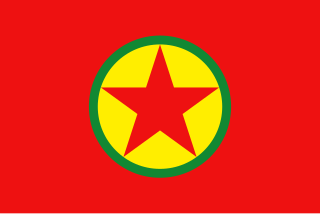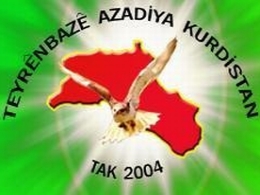| 1999 Istanbul bombings | |
|---|---|
| Location | Istanbul, Turkey (geographical coordinates 41°00′44″N28°58′34″E / 41.01224°N 28.976018°E ) |
| Date | March 13 and 14, 1999 (UTC+2) |
Attack type | Bombings and arson attack |
| Deaths | 13 |
The 1999 Istanbul bombings were a pair of bombings that took place in Istanbul, Turkey on March 13, killing 13, and March 14, 1999, injuring two. A third bomb was found in a Burger King outlet but successfully defused.
A Turkish court sentenced Cevat Soysal to 18 years and nine months in prison on June 25, 2002, for allegedly having ordered the attack. [1]
These three events caused widespread fear and anger among the people of Turkey and brought more attention to the Kurdish PKK party, who were blamed for the bombings; in the aftermath, one of their leader, Cevat Soysal, was taken to court. The media called the PKK and its leaders "terrorist," "traitors to their country," and "insidious." [3] These events also disrupted financial inflows to Turkey because the bombings were focused on very busy areas, and resulted in tourist warnings being issued.
Authorities arrested several people suspected of involvement in the bombings, most notably Cevat Soysal. "Cevat Soysal was taken into custody by authorities under the suspicion of being a leader in the PKK on 13 July 1999 in Chișinău, Moldova. The indictment said that he had been in contact with Abdullah Ocalan, the leader of the PKK, and allegedly provided Mr. Ocalan with information about people he had trained to commit violent acts. An accusation based on a number of phone calls from Soysal's phone that were recorded through wiretap. The prosecution claimed that after the arrest of Mr. Ocalan, Soysal ordered a series of violent acts to occur, including the bombings of Marvi Carsi on March 13 and March 14. The courts tried to pin these two incidents on Soysal but could not. These accusations did not hold up because of how general Soysal spoke over the recorded phone calls.
During the trial, Soysal's lawyer asked for the phone log recording between Soysal and the other supposed people. The court denied him access to these recording on multiple occasions. The prosecution then sought out a verbal sample to compare to the recording they already had but Soysal refused since he was not allowed to hear the recording that were being used as evidence. Soysal also asked for the criminal case concerning the bombing of Marvi Carsi but that was denied as well. Soysal's lawyer petitioned for access to these files and recordings every court date but it kept getting denied. The reason it kept being declined was that it had already been denied before. At the end of the court dates Soysal was convicted of membership of the PKK under Article 168 1 of the former Criminal Code and sentenced to eighteen years and nine months' imprisonment. The court trials lasted from 1999 to 2002. [3]
The Soysal trial was widely criticized, largely because most of the expert opinion on the evidence was provided by police officers, [4] who were accused of being biased because many police officers died in the bombings. The court was also criticized for failing to get an unbiased expert that would satisfy both sides., [3] and after the case, the PKK targeted the police more aggressively with bombs. One was a suicide bomber that walked up to a group of police and set off her bombs killing multiple police and civilian. A couple of her bombs did not go off and were diffused by experts afterward. [5] The next bombing was on a police bus again in a busy area. The bomber set of the bombs on the side of the bus killing several police officers. [6] Similar bombings continued for some time. Eventually, on 30 November 2008, Cevat Soysal was released from prison on probation and returned to Germany, where his family was living.

The Kurdistan Workers' Party or PKK is a Kurdish militant political organization and armed guerrilla movement which historically operated throughout Kurdistan but is now primarily based in the mountainous Kurdish-majority regions of southeastern Turkey and northern Iraq. Since 1984, the PKK has been involved in asymmetric warfare in the Kurdish–Turkish conflict. Although the PKK initially sought an independent Kurdish state, in the 1990s its goals changed to seeking autonomy and increased political and cultural rights for Kurds within Turkey.

Abdullah Öcalan, also known as Apo, is a political prisoner and founding member of the militant Kurdistan Workers' Party (PKK).
The history of the Kurdistan Workers' Party (PKK) began in 1974 as a Marxist–Leninist organization under the leadership of Abdullah Öcalan. In 1978 the organization adopted the name "Kurdistan Workers Party" and waged its low-level Urban War in Turkish Kurdistan between 1978 and 1980. The PKK restructured itself and moved the organization structure to Syria between 1980 and 1984, after the 1980 Turkish coup d'état. The Kurdish-Turkish conflict began in earnest in 1984. The rural-based insurgency lasted between 1984 and 1992. The PKK shifted its activities to include urban attacks against Turkish military bases between 1993–1995 and later 1996–1999. Öcalan was captured in Kenya in early 1999. After a "self declared peace initiative of 1999", hostilities resumed in February 2004. 2013 saw another ceasefire, but the conflict resumed again in 2015 and has continued since.

The Kurdistan Freedom Hawks or TAK, is a Kurdish nationalist militant group in Turkey seeking an independent Kurdish state in Turkish Kurdistan. The group also opposes the Turkish government's policies towards Kurds in Turkey.
The 2008 Istanbul bombings occurred on July 27, 2008 when two explosions hit a busy shopping street in the Güngören district of Istanbul, killing seventeen people, five of them children, and injuring 154. The attacks occurred at 9:45 p.m. local time, 18:45 UTC, on a pedestrian street closed to traffic. The bombings were the deadliest civilian attacks in Turkey since the 2003 Istanbul bombings, five years earlier.

This is the timeline of the Turkish-Kurdish conflict. The Kurdish insurgency is an armed conflict between the Republic of Turkey and various Kurdish insurgent groups, which have demanded separation from Turkey to create an independent Kurdistan, or to have autonomy and greater political and cultural rights for Kurds in Turkey. The main rebel group is the Kurdistan Workers' Party or PKK, which was founded on November 27, 1978, and started a full-scale insurgency on August 15, 1984, when it declared a Kurdish uprising. Apart from some extended ceasefires, the conflict has continued to the present day.
The word serhildan describes several Kurdish protests and uprisings since the 1990s that used the slogan "Êdî Bese" ("Enough") against Türkiye. Local shops are often closed on the day of demonstrations as a form of protest.

The Kurdistan Communities Union is a Kurdish political organization committed to implementing Abdullah Öcalan's ideology of democratic confederalism. The KCK also serves as an umbrella group for several confederalist political parties of Kurdistan, including the Kurdish militant political organization and armed guerrilla movement Kurdistan Workers' Party (PKK), Democratic Union Party (PYD), Kurdistan Free Life Party (PJAK), and Kurdistan Democratic Solution Party (PÇDK). Finland and Sweden's alleged support for the KCK, is one of the points which caused Turkey to oppose Finland and Sweden's NATO accession bid.

The 2010 Istanbul bomb blast was a suicide bombing that took place on Taksim Square in Istanbul, Turkey on 31 October 2010. The bomb resulted in at least 32 injuries, 15 of whom were police officers and was claimed by a Kurdish secessionist group known as the Kurdistan Freedom Hawks (TAK).
The 2011–2012 Kurdish protests in Turkey were protests in Turkey, led by the Peace and Democracy Party (BDP), against restrictions of Kurdish rights by of the country's Kurdish minority's rights. Although they were the latest in a long series of protest actions by Kurds in Turkey, they were strongly influenced by the concurrent popular protests throughout the Middle East and North Africa, and the Turkish publication Hürriyet Daily News has suggested that the popularly dubbed "Arab Spring" that has seen revolutions in Egypt and Tunisia may lead to a "Kurdish Summer" in the northern reaches of the Middle East. Protesters have taken to the streets both in Istanbul and in southeast Turkey, with some demonstrations also reported as far west in Anatolia as İzmir.
The February 1999 Kurdish protests were held by Kurds in Turkey, Iran and by the Kurdish diaspora worldwide, after Kurdistan Workers' Party leader Abdullah Öcalan had been captured at the Nairobi airport in Kenya, after having left the Greek embassy, and was brought to Turkey to stand trial for terrorism promoting separatism and treason.

The Solution process, also known as Peace process or the PKK–Turkish peace process, was a peace process that aimed to resolve the conflict between the Turkey and PKK as part of the Kurdish–Turkish conflict (1978–present). The conflict has been ongoing since 1984 and resulted in some 40,000 mortal casualties and great economic losses for Turkey as well as high damage to the general population.
In late July 2015, the third phase of the Kurdish–Turkish conflict between various Kurdish insurgent groups and the Turkish government erupted, following a failed two and a half year-long peace process aimed at resolving the long-running conflict.

On 7 June 2016, at around 08:40 (UTC+3), a bombing occurred in central Istanbul, Turkey, killing 12 people and injuring 51 others, three of them seriously. The attack targeted a bus carrying policemen as the vehicle passed through the Vezneciler district near the Şehzade Mosque and the Vezneciler Metro station.

On the evening of 10 December 2016, two explosions caused by a car bombing and suicide bombing in Istanbul's Beşiktaş municipality killed 48 people and injured 166 others. 39 of those killed were police officers, 7 were civilians and 2 were perpetrators. The Kurdistan Freedom Hawks (TAK) assumed responsibility, claiming that their members killed more than 100 police officers.
The Blue Market massacre refers to the terrorist attack of Kurdistan Workers' Party (PKK) on 13 March 1999 which resulted in the killing of 13 civilians.
Definition of terrorism in Turkey is categorized under Turkey's criminal law as crimes against the constitutional order and internal and external security of the state by the use of violence as incitement or systematic to create a general climate of fear and intimidation of the population and thereby effect political, religious, or ideological goals. Since the establishment of the Republic of Turkey, both organized groups, lone wolf, and international spy agencies have committed many acts of domestic terrorism against Turkish people.
The trial of Abdullah Öcalan, the leader of the Kurdistan Workers' Party (PKK), began on 31 May 1999 and concluded on 29 June with a Death sentence for treason and separatism. Öcalan was captured in February 1999 in Nairobi, Kenya and brought to Turkey where he was imprisoned on the İmralı island in the Sea of Marmara. After his conviction, Öcalan appealed to the European Court of Human Rights (ECHR), which ruled he did not have a fair trial and demanded a retrial. The death sentence was confirmed by the Court of Cassation in November 1999 and Turkey denied Öcalan a retrial. His death sentence was commuted into life imprisonment in October 2002.

A terrorist attack occurred on İstiklal Avenue in the Beyoğlu district of Istanbul, Turkey, on 13 November 2022, killing 6 people and injuring 81 others.

The Kurdistan Workers' Party insurgency is an armed conflict between the Republic of Turkey and the Kurdistan Workers' Party, as well as its allied insurgent groups, both Kurdish and non-Kurdish, who have either demanded separation from Turkey to create an independent Kurdistan, or attempted to secure autonomy, and/or greater political and cultural rights for Kurds inside the Republic of Turkey.